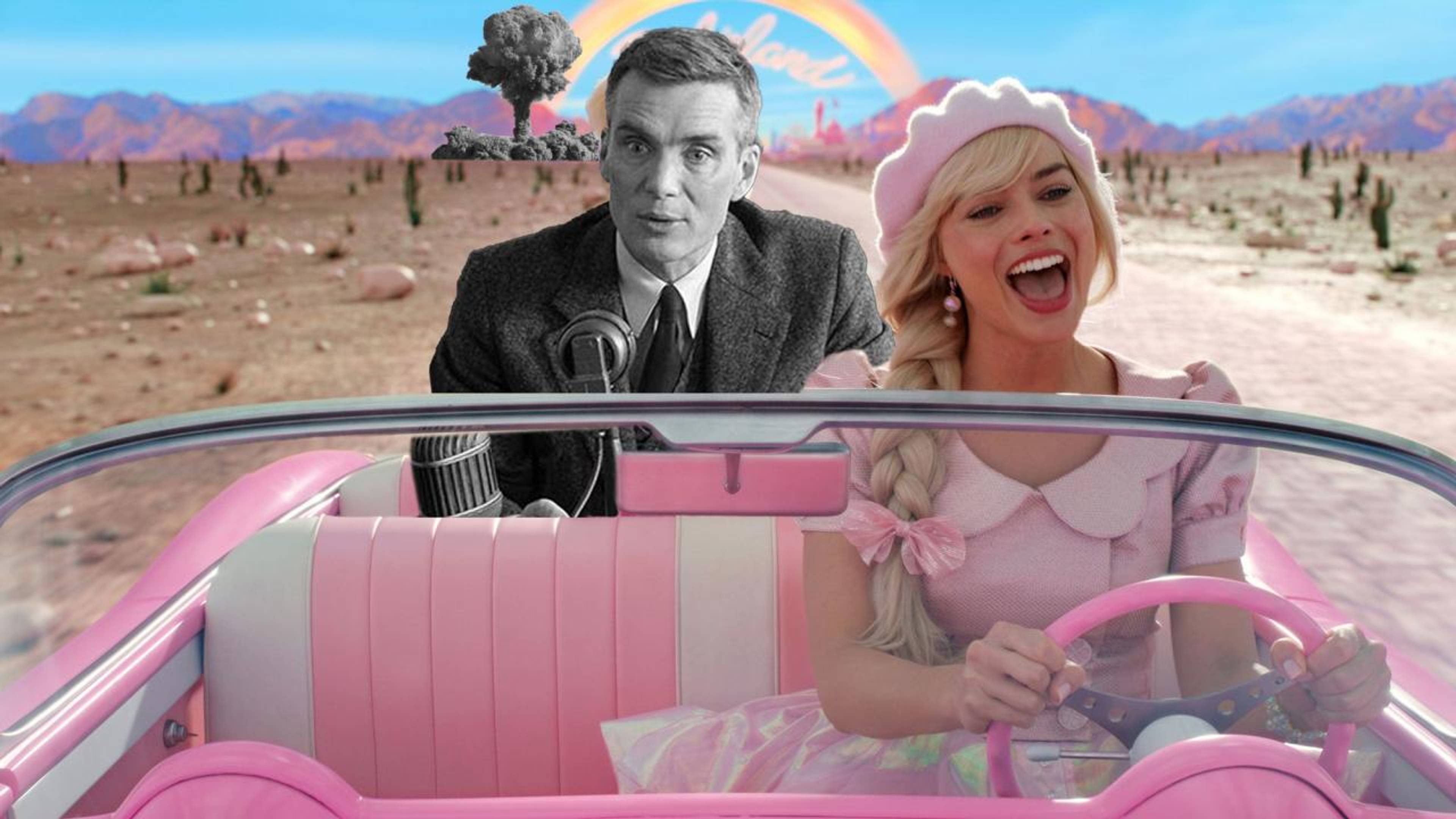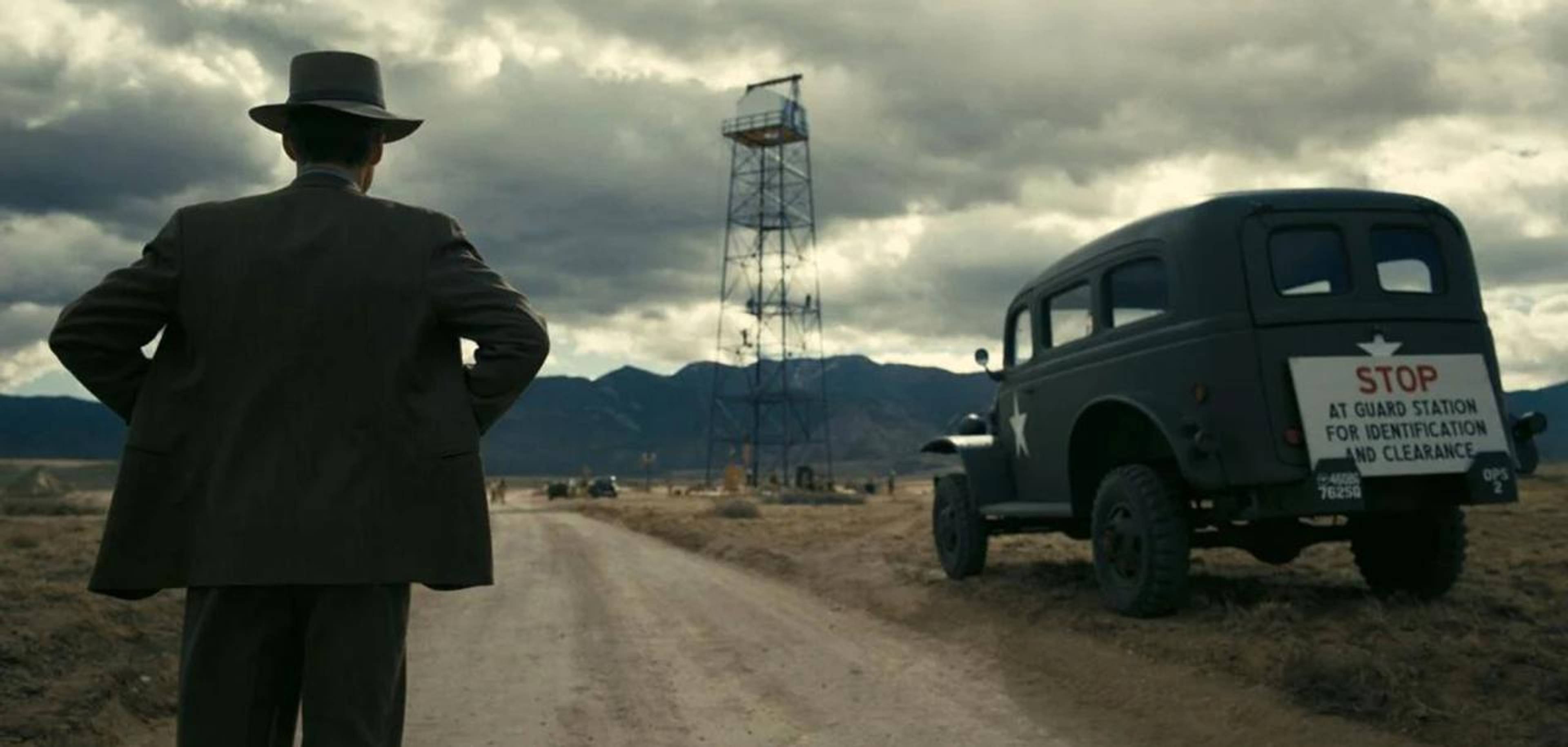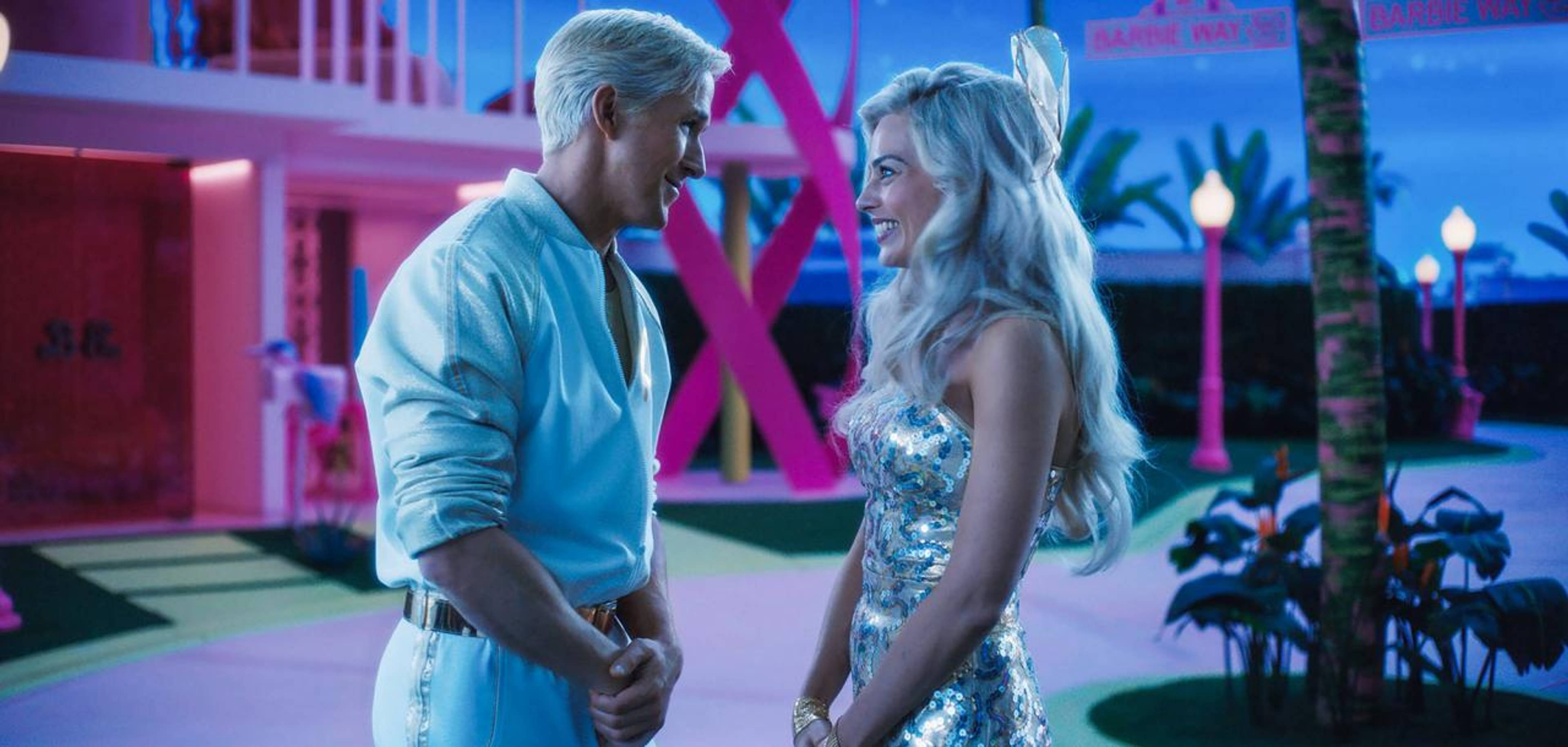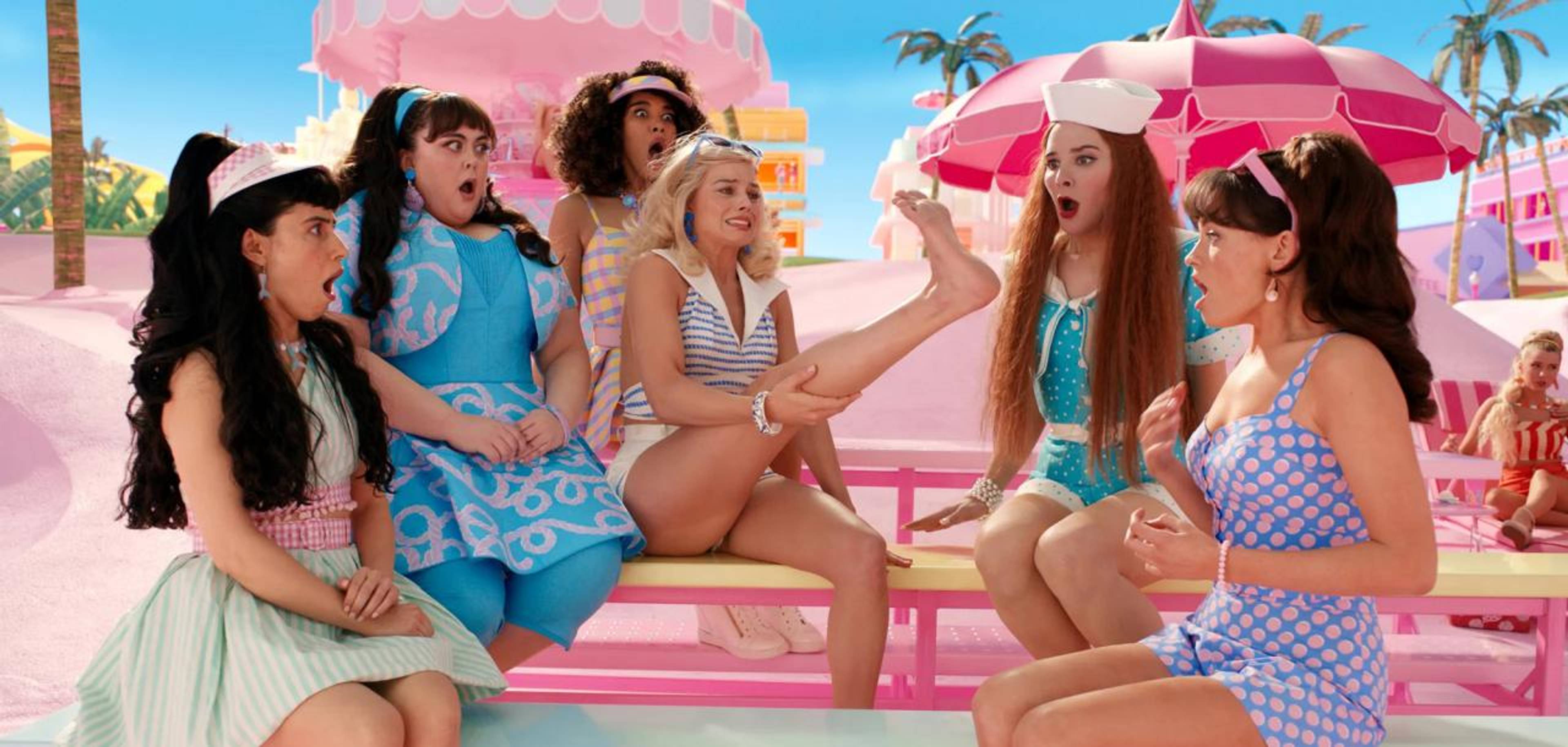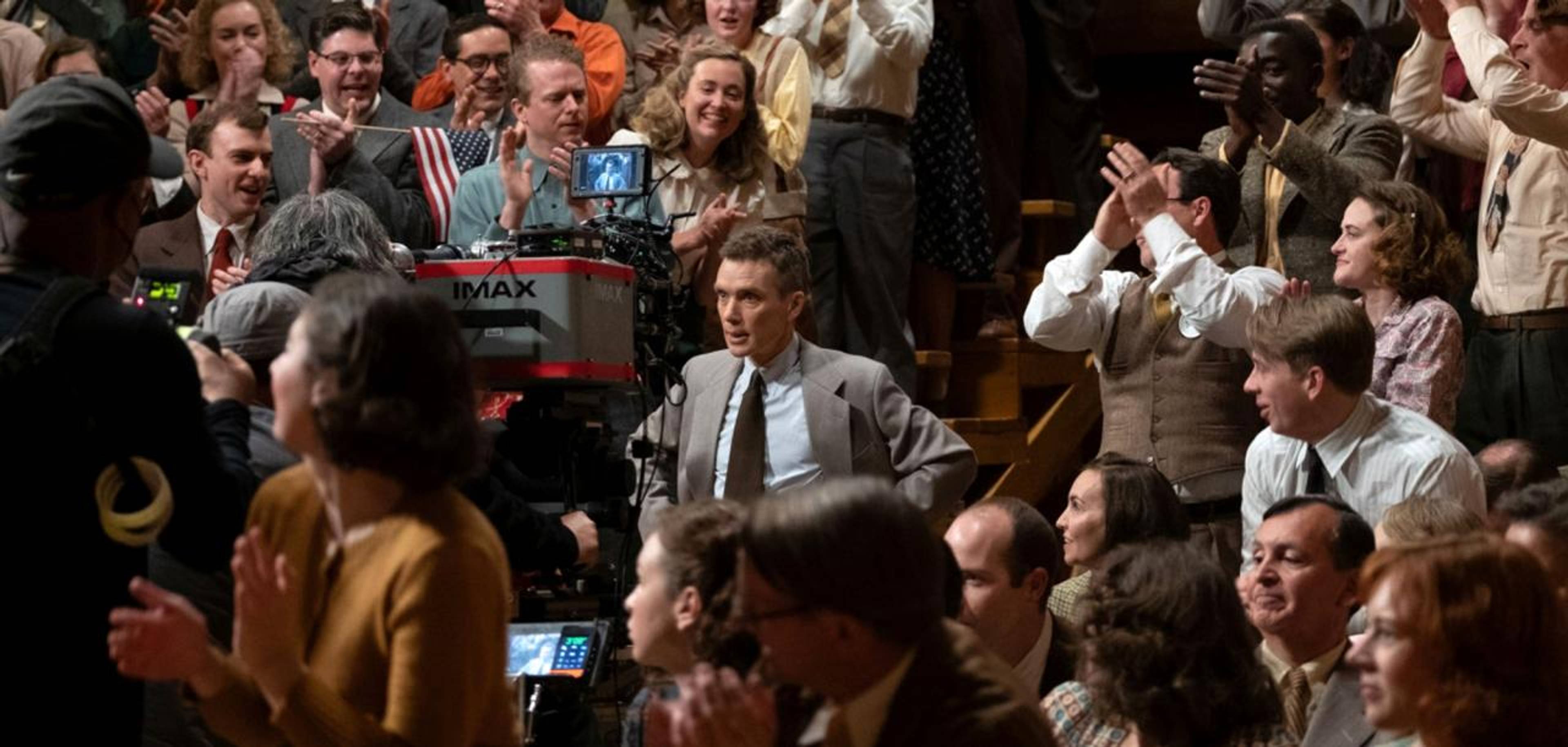Women create; men destroy. If the future is female (which we know from Dior T-shirts) and the past extremely male (which we know from world history), we can contextualize the awfulness of the present while still holding out hope for a more tolerable tomorrow. It will take a strong, brave, impossibly perfect woman to crawl out of the wreckage and put things back in order, but she can do it – she can do anything. This is the teleology of Barbenheimer, a currently unavoidable internet phenomenon inspired by the odd bedfellows Greta Gerwig’s Barbie (2023) and Christopher Nolan’s Oppenheimer (2023) made when they shared a US premiere date last Friday.
It’s remarkable how complete a worldview can be formed by the contrast of these two Hollywood productions. Though it doesn’t quite extend to the actual movies themselves, the overarching narrative logic of Barbenheimer was alive and present from the earliest memes, and quickly transformed from an online amusement to a matter of surprising seriousness – a civic duty, almost, to attend the theatrical screenings. Like a lot of memes, it played on variations of extreme duality. J. Robert Oppenheimer, a man in a fedora who masterminded the atomic bomb, is best known for the words “I have become death, the destroyer of worlds.” Barbie, by contrast, is a physiologically unrealistic piece of plastic known less for her sayings than her outfits, but whose outlook can be best summed up by a lyric from the dance-pop outfit Aqua’s 1997 single: “Imagination, life is your creation.”
Still from Greta Gerwig, Barbie, 2023, 114 min. © Warner Bros
Still from Christopher Nolan, Oppenheimer, 2023, 180 min. © Universal
The online frenzy was created semi-accidentally, when Warner Bros. slated Barbie for a 21 July release at least partially in retaliation against Nolan’s defection to Universal, following a twenty-year stint working with Warner. The monomaniacal Nolan was then cajoled into making a bunch of fake-friendly statements about how he welcomes the competition of a “crowded marketplace,” which clearly infuriated him, drawing further attention to a looming box-office battle. Then the floodgates of the internet opened and the tide of content came rushing out, surpassing what anyone could have predicted.
The resulting anticipation has been unprecedented, especially for a time where studios prioritize the safe bet of a sequel over original storytelling. For a while now, everyone’s been talking about the summer blockbuster as though it had gone the way of actual Blockbuster. On top of this, Barbie and Oppenheimer weren’t your typical Tom Cruise action flick or franchise expansion, but were instead billed as challenging, middlebrow entertainment. In the weeks leading up to their twinned birth, the sheer ubiquity of both made us feel like we were really living for something different, something that might actually help us to grow and understand ourselves better.
Despite literally being IP about plastic, Barbie manages to capture a broader range of human emotions and self-consciousness than most movies about people.
I arrived at the theater on Friday with only the vaguest idea of what the next five hours held in store ( Barbie ’s trailers were little more than three-second gag reels; Oppenheimer ’s focused almost entirely on a big explosion), but with the unshakable conviction that I would discern something revelatory when I made a whole from these two halves. It didn’t even occur to me not to see both; my time online this past July had eroded the individuality of each. But all the speculation surrounding the Barbenheimer phenomenon belied the fact that (until some very slick crossover fan edits appear) the immaculate androgyne must separate itself into recognizably gendered forms. Seen individually, I soon came to realize that I had taken these films not only to be interrelated, but on somehow equal footing in terms of quality.
I was wrong. Oppenheimer is a largely forgettable three-hour slog whose most exciting part (a big explosion) can be experienced for free in its promotional material. Barbie, meanwhile, is a candy-coated joyride that manages one of the more direct, engrossing, and entertaining polemics against patriarchy ever produced. Oppenheimer ’s story structure is suspended between competing, at times conflicting, bureaucratic ordeals – the protagonist’s security clearance review and a Senate confirmation hearing for a Cabinet official. Instead of grappling with the moral implications (and real historical consequences) of nuclear war, the film spirals inward, obsessing over reputational minutiae. Barbie, meanwhile, kicks off with a heartfelt parody of 2001: A Space Odyssey (1968) and ends with a heartfelt parody of Molly Bloom’s soliloquy in Ulysses (1920) – gesturing to some of the farthest reaches of human exteriority and interiority (at least, as imagined by men) in one sitting. Despite literally being IP about plastic, it manages to capture a broader range of human emotions and self-consciousness than most movies about people.
Still from Greta Gerwig, Barbie, 2023, 114 min. © Warner Bros
Still from Christopher Nolan, Oppenheimer, 2023, 180 min. © Universal
As was widely predicted, “bombs before bombshells” was the correct viewing order, and not just because Oppenheimer is depressing and Barbie uplifting. Gerwig’s deft skewering of male insecurities actually makes the two films feel like they’re in conversation – only Oppenheimer is unaware of it, rotely reconstructing a moody tale of power grabs and remote self-mysticism, while Barbie looks at that kind of behavior and laughs.
Nearly a half hour passes in Nolan’s film before a woman so much as appears onscreen. When she finally does (it’s Florence Pugh), it’s only a few seconds before she’s riding Oppenheimer (Cillian Murphy) topless and commending how good of a lay he is. She remains naked in every single one of her scenes – except for the part where she drowns herself in a bathtub because the well-endowed physicist doesn’t return her love. He’s tortured by this, in a kind of self-empowered way. The two other women with speaking roles in the following one hundred fifty minutes are, respectively, Oppenheimer’s wife (Emily Blunt), who calls him a coward when she’s drunk (she’s always drunk), and a nameless, token physicist whose sole scene involves defending her right to work on the Manhattan Project despite the possible irradiation of her ovaries. When they first arrive at Los Alamos, Mrs. Oppenheimer notes that their new home lacks a kitchen. “Don’t worry,” Oppie says reassuringly, “we’ll fix that.”
GERWIG embraces a narrative logic based on the innate pleasure of playing with dolls: making up loose stories or immediately resolvable conflicts, but also projecting onto them one’s ideas and ideals.
Barbie, meanwhile, generously makes time for the Kens. Gerwig has always been extraordinarily attuned to self-aggrandizing masculine perceptions (twice now, she’s cast Timothée Chalamet not as Saoirse Ronan’s lover, but as the asshole who thinks he can handle Saoirse Ronan), and the first few minutes Barbie (Margot Robbie) and Ken (Ryan Gosling) spend in the Real World immediately evoke all the small ways that men and women traverse this world differently. Barbie discovers that construction sites are not ideal places to get a pep talk, and she feels menaced by the eyes that follow her neon unitard through Los Angeles. Ken, meanwhile, feels respected and admired simply by walking down the street, and soon starts reading up on world history and horses. He beats Barbie back to Barbie World and turns it into the ruinous Kendom – trashing the Dream Houses, brainwashing the President to serve him lite beer, and performing ritualized, four-hour acoustic jam sessions toward the Barbies of his choice. The Barbies, in turn, get their kingdom back by playing on the Kens’ petty insecurities, coaxing small slights into open war on their plastic beach.
I wasn’t sure what to expect Gerwig’s film in terms of mechanics and plot, but it works because the director wholeheartedly embraces a narrative logic based on the innate pleasure of playing with dolls: making up loose stories or immediately resolvable conflicts, but also projecting onto them one’s ideas and ideals. Barbie has to be perfect all the time, including when she deals with discoveries of imperfection. Robbie’s portrayal of the plastic heroine turns her own desire for complacency into a tragic flaw, making the necessary challenges of her journey feel monumental and menacing – and humanizing her for enduring them, as a human would, with panic and existential dread.
Still from Greta Gerwig, Barbie, 2023, 114 min. © Warner Bros
Still from Christopher Nolan, Oppenheimer, 2023, 180 min. © Universal
Oppenheimer, meanwhile, regards its subject with the distance of sainthood. Adapted from a book called American Prometheus (2005), the biopic unspools his entire life while keeping all his thoughts and emotions totally secret. People openly wonder to Oppenheimer’s face how he must feel about the likes of, say, using atomic weapons on unsuspecting civilians; he seems content to silently smoke a cigarette by way of reply. Other than a single, spectacular scene of dissonant surrealism, where the horrors of nuclear fallout seem to crowd in around him, there’s no telling. The film preoccupies itself instead with the day’s hotly debated policy issues, like whether or not to share uranium isotopes with Sweden. While that might have been an important facet of the Cold War at some point, it’s far too esoteric for Nolan’s cloak-and-dagger game of competing masculinities. Boy energy is so brooding.
After watching Oppenheimer first, and being disappointed by it, it was clear to me that the internet hype had given it a pretty sweet ride on Barbie’s coattails. The former is an indulgently wonkish look at a man who, though having made a massive impact on history, remains obscure and ambiguous as a subject. Morally bleak and politically obsolete, it’s not exactly crowd-pleasing material. But it wasn’t until I was halfway through Barbie that it occurred to me that Barbenheimer might have been perpetuated so hard online because it gave men a valid excuse to go see Barbie. Whether or not this is true, it could be good news; I really hope that a lot of men do go see this movie. Not only will they laugh, they will cry when they feel secure in the fact that no one’s looking at them, and they may even leave with a renewed appreciation for their mothers. At the very least, they will think twice before serenading some girl they just met with their variation of “Wonderwall.”
Still from Greta Gerwig, Barbie, 2023, 114 min. © Warner Bros
Still from Christopher Nolan, Oppenheimer, 2023, 180 min. © Universal
___


